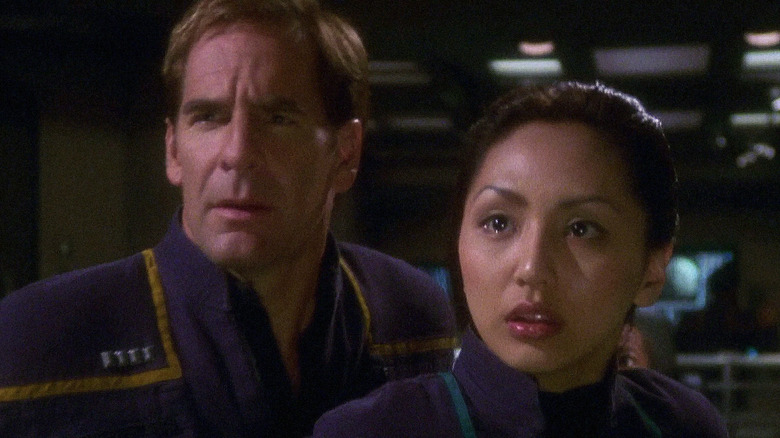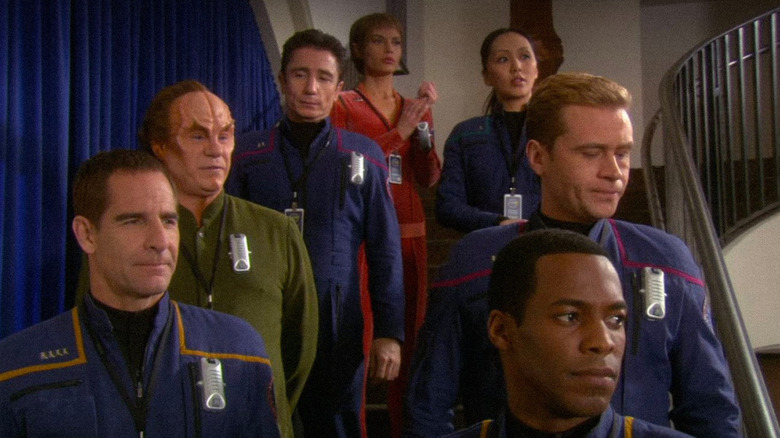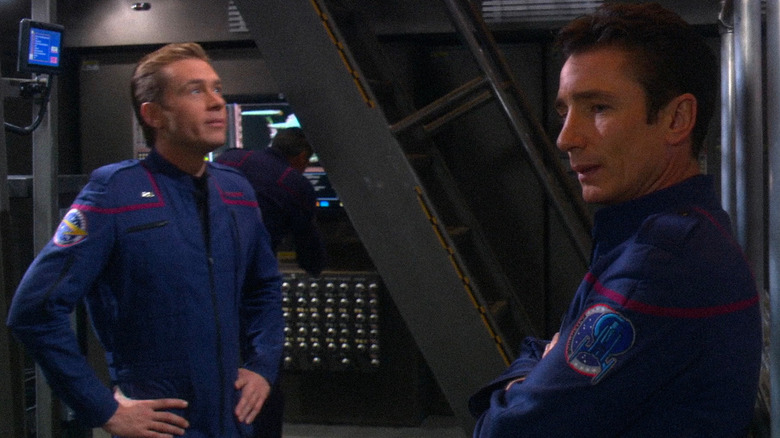Scott Bakula Thinks This Is Why Star Trek: Enterprise Was Doomed
"Star Trek: Enterprise" was the first "Star Trek" series I watched to completion and loved unequivocally. It was the first installment that locked me firmly into the franchise's tractor beam. Unfortunately, "Enterprise" hasn't enjoyed as much praise in other corners of the fandom. The series is infamously regarded as the black sheep of "Star Trek." It was marketed as the angsty prequel to the original series that started it all and set 100 years before the voyages of the starship piloted by James T. Kirk — which could have given fans a perfect window into the tumultuous beginning of Starfleet.
But "Enterprise" was by no means perfect. At best, it was rife with missed opportunities. The series tried to deliver on its prequel premise, but largely abandoned enticing "here's how this happened" storylines in favor of extraneous threads. Some of its most promising episodes were those that dealt in the gritty reality that humans faced in lawless space, but those narratives were few and far between. Plus, its theme song apparently sucked (I'm not ashamed to say I loved it, though).
The series finally started to find its footing in its fourth season, but sadly, it wasn't enough to save the "Enterprise" crew from a decisive end. So much was working against "Enterprise" from the get-go. In fact, according to Scott Bakula, who starred in the series as Captain Jonathan Archer, it was plagued with even more tumult behind the scenes
These were the ill-fated voyages...
The early 2000s were a time of total reformation. Network TV was about to reach a sort of apex, but as a result, many networks were struggling to catch the wave. The United Paramount Network (UPN) was one such network, the one that "Enterprise" called home. UPN was jointly owned by ViacomCBS and Paramount when "Enterprise" premiered in 2001. "We were kind of their big star representation," Bakula told Bob Saget on his podcast, "Bob Saget's Here For You."
Though the series was one of UPN's prestige projects, it still struggled more than the "Star Trek" series that came before. "Enterprise" was the first of the franchise relying solely on a network; every other "Star Trek" show began in syndication. "We were subject to the whims of the network and the advertisers," Bakula recalled. To the actor, this was a major factor in their cancellation:
"All the other [Star Trek shows] ... set up their deals with all the little stations all around America for seven years, and they went and made a TV show for seven years. Which we would have done also if we had been syndicated."
The plight of the Enterprise
In reality, syndication was the least of the show's worries. By 2005, the partnership between Viacom and Paramount was crumbling. Both UPN and its sister network, The WB, were struggling financially. When Viacom and CBS split up the following year, the networks merged to create The CW, sending so many shows into jeopardy. "Enterprise" itself had been culled months before, but Bakula remembers the "political" turmoil that contributed to it.
"Networks [were] being bought and sold and studios [were] changing personnel completely," the actor said. Even the series' original showrunners, Rick Berman and Brannon Braga, were unceremoniously replaced in the final season. Ironically, many have named said season the strongest of the four. On paper, "Enterprise" really was hitting its stride, only to face the ax before the dawn of a new network.
Still, for all its flaws and missed opportunities, so many "Star Trek" fans enjoyed "Enterprise." It's one of the few series that's enjoyed a consistent, dogged campaign for a revival, including a new petition that started circulating in 2021. In a lot of ways, it's as good a time to bring "Enterprise" back as any. JJ Abrams' 2009 revamp helped breathe new life into "Star Trek," and since then the franchise has rebounded on television in a big way. Even Viacom and CBS have made up, rebranding decisively and simply as Paramount.
With a new banner for all the "Star Trek" shows, could "Enterprise" actually secure a fifth (or even sixth) season? I wouldn't hold out much hope for one, but anything is possible after a well-timed corporate rebrand.


